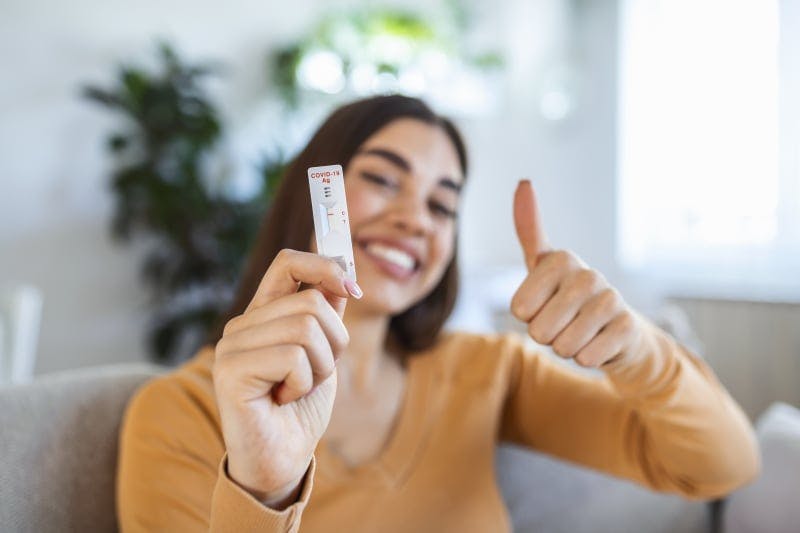Rapid Covid-19 tests are becoming increasingly popular whether you are travelling or going to a crowded place. But how do you know if it’s accurate and when you should take it with all the jargon floating around? Find everything you need to know about the accuracy and reliability of lateral flow tests in this short, easy-to-read guide.
Written by
Dr Adam Abbs
Doctor
Reviewed by
Dr Zubair Ahmed
Doctor
Last Updated:
Guide contents
01How accurate are Rapid Covid-19 tests?
02Chances of receiving a false positive Rapid Covid test
03Chances of receiving a false negative Rapid Covid test
04What do you do if you have a negative Rapid Covid test result but have Covid-19 symptoms?
05When is the antigen test most accurate?
06Are Rapid COVID-19 Test Results Reliable?
07If it is less accurate and reliable than PCR, why is a rapid test used?
How accurate are Rapid Covid-19 tests?
Rapid Covid-19 tests are lateral flow antigen tests that provide quick results without the need for laboratory analysis like a PCR test does. While both PCR and Antigen tests detect current infection, the accuracy of a Rapid Covid-19 test depends on whether or not the person is symptomatic.
Rapid Covid test Accuracy for people with Covid-19 symptoms
Studies show that for people with Covid-19 symptoms who were infected with Covid-19, antigen tests had a high accuracy of 72%. For people that had Covid-19-like symptoms but did not have Covid-19, the antigen tests ruled out infection in 99.5% of people. This puts antigen tests at par with PCR tests.
Rapid Covid test Accuracy for people without Covid-19 symptoms
If a person does not have symptoms of Covid-19 but is infected with Covid-19, the rapid test has an accuracy of 58%. For people without Covid-19 symptoms who did not have Covid-19, the antigen test ruled out infection in 98.9% of people.
Chances of receiving a false positive Rapid Covid test
A false positive result is when a test shows a positive Covid-19 result when, in reality, the person is not infected with the virus. The Department of Health and Social Care (DHSC) noted that lateral flow tests have a low chance of a false positive result. With a specificity of at least 99.9%, lateral flow tests show fewer than 1 false positive every 1000 tests.
Chances of receiving a false negative Rapid Covid test
A false negative result is when a test shows a negative Covid-19 result when, in reality, the person is infected with the virus. There is a high risk of receiving a false negative result with a false negative rate of approximately 50%. This is because lateral flow tests require a high viral load to record a positive result, meaning that the person with the virus may not be at their peak infectious stage.
What do you do if you have a negative Rapid Covid test result but have Covid-19 symptoms?
The NHS recommends that if a person is showing Covid-19 symptoms but receives a negative lateral flow result, they should get a PCR test to confirm infection or non-infection. This is because PCR more accurately identifies the presence of small quantities of Covid-19 virus.
When is the antigen test most accurate?
A study by the Public Health England showed that lateral flow tests were accurate enough to be used for both symptomatic and asymptomatic people infected with Covid-19. However, the lateral flow test is the most accurate in symptomatic people at peak infection when the virus levels are the highest and the person is the most infectious. This is typically within 3 to 5 days of exposure to Covid-19. Rapid tests accurately record infection 78.3% of times during the first week of infection compared to 51% during the second week of infection.
Are Rapid COVID-19 Test Results Reliable?
The Medicines and Healthcare products Regulatory Agency (MHRA) mentions that no test is 100% reliable even if it meets regulatory standards for performance and safety. The NHS notes that rapid Covid-19 tests are reliable enough and a person should do a test when they are more likely to catch or spread the Covid-19 virus.
If it is less accurate and reliable than PCR, why is a rapid test used?
Lateral flows have several benefits over PCR tests:
- Provides results within minutes instead of days
- More accessible and portable than a lab test, where you can conduct a rapid test on the go or from the comfort of your own home
- Significantly less expensive than lab-based tests.
Many countries accept lateral flow tests as a valid test for travel for the fully vaccinated.
So, how does it work?
Book in seconds
Select a day and time that suits you — then see a doctor on your phone or at a pharmacy.
Speak to a doctor
Have a video consultation and be examined by one of our expert doctors.
Get back to feeling better
Whether it’s a diagnosis, personalised treatment plan or prescription — our doctors can help.
